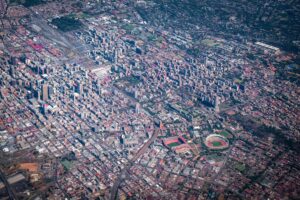Published on behalf of the School of Architecture and Planning, University of the Witwatersrand, Johannesburg.

Photo by Magda Ehlers / Pexels.
WEF POST LONGUE DURÉE – REMEDIATING EXTRACTIVE URBANISM
Duration: 1 July 2022 to 30 June 2024
Deadline: 15 May 2022 (or until filled)
We invite applications from suitably qualified applicants for this two-year postdoctoral fellowship. The post will be based in Johannesburg as part of the WEF POST LONGUE DURÉE research project. This Merian Fund initiated project (mid-2022 to 2025) into sustainability transitions in post-mining landscapes through the design and rebalancing of the water-energy-food nexus will be conducted by an international research consortium based in South Africa and the Netherlands.
We are looking for someone with skills and motivation to address urban and rural landscapes where gold, uranium, coal and other minerals were, and will be extracted, with accompanying toxicity, single-use infrastructure, short-term employment, and harm to human and non-human ecologies.
Applicants should have the potential to link environmental sciences, engineering, urban histories and environmental justice to design-led visions for remediation of such places. We are also looking for someone with excellent organisational skills in managing academic work and public platforms.
Applicants should have a background in at least one of the following fields: sustainability transitions; environmental sciences and/or environmental humanities; chemical or civil engineering; alternative energy; geography; landscape architecture; urban design; urban history; urban planning and urban agriculture.
The partners include the School of Architecture and Planning, University of the Witwatersrand, the Wits Mining Institute (WMI), the Gauteng City Region Observatory (GCRO), and the University of Venda in South Africa, with the Delta Urbanism Interdisciplinary Research Group, and the History in Architecture and Urban Planning Group in the Department of Architecture at TU Delft.
This collaborative inter- and transdisciplinary team will also draw in different areas of academic and practice-led expertise, as well as policy, spatial and environmental practice and local stakeholders. The project participants will, in turn, offer networking and research support, sustaining and growing a new area of design-led analysis and practice in post-extractive urbanism. The project aims to have both site-specific and scaleable impacts.
The postdoctoral fellow will be expected to research towards and co-ordinate the project’s activities in the field of research and education at the home institution, specifically:
- Coordinating collaborative activities between the partners including travel to sites of extraction in South Africa, seminars, and research repositories;
- Planning and teaching in a graduate-level design studio, along with the PhD candidates on the project;
- Managing grant-related communications and reporting;
- Connecting with stakeholders in the state and civil society beyond the academic partners;
- Maintaining active research interests in the project’s research areas, including through co-publication;
- Presenting on the project in local and international workshops and conferences.
The organisational aspects of the fellowship will constitute about 50% of the workload while the balance of time will be allocated for research in a cognate area towards independent publication and co-publication with partners. The expectation is two ISI-indexed research publications over the two-year period of the grant.
Requirements and renumeration
The postdoctoral fellowship will run from July 2022 for two years. It is supported by a grant funded by the South African National Research Foundation (NRF) through the Merian Fund cooperation programme.
The value of the fellowship in 2022 is R360 000.00 per annum, as well as an IT allowance, Discovery KeyCare medical plan or equivalent, reimbursement for travel between project sites, and one return trip to TU Delft in the Netherlands to engage with the project partnership based there. A relocation allowance will be considered for out-of-town applicants. This is a full-time position and fellows may not hold full-time
salaried employment elsewhere during the tenure of the fellowship. The fellowship is compliant with the SARS policies/rules and is, therefore, exempt from taxation.
Applicants must have completed their doctoral degrees within the last five years and have proven ability in research and writing. Design studio experience will be a recommendation. South African citizens and permanent residents may apply, as well as outstanding international candidates who wish to undertake postdoctoral research in South Africa. Applicants should commit to holding a driver’s license and have conversational skills in a local language by the middle of 2023.
To apply, please submit the following documents to hannah.leroux@wits.ac.za:
- A covering letter stating your expertise, research interests and motivation for the fellowship
- A CV including a verifiable record of organisational experience
- Full academic transcripts
- The contact details of two academic referees who have taught, supervised or worked with you
- Two short recent pieces of written work, design project (where relevant), or publication.
CLOSING DATE – 15 May 2022
Enquiries on the scope and content of the research field and fellowship/bursary criteria should be made to Associate Professor Hannah le Roux at hannah.leroux@wits.ac.za.
Please note that we will only enter into correspondence with shortlisted candidates. We reserve the right to disqualify ineligible or incomplete applications, to change the conditions of the fellowship, and/or to make no award at all.
Partnership links:
- Merian Fund
- Wits School of Architecture and Planning
- Wits Mining Institute Centre for Sustainability in Mining and Industry
- Gauteng City-Region Observatory
- University of Venda
- TU Delft Faculty of Architecture and the Built Environment
- Delta Urbanism: Interdisciplinary Research Program
- History of Architecture and Urban Planning
Further information:
related Articles
DSI-NRF postgraduate student funding for the 2024 academic year
Photo: Yan Krukau/Pexels. The Department of Science and Innovation (DSI) and the National Research Foundation (NRF) are pleased to announce…
The importance of a food safety framework for the informal sector
Photo Omotayo Tajudeen / Pexels. “There is a pressing need for the informal sector to have a fit-for-purpose system. We…
NRF postgraduate call for funding for the 2023 academic year
Prospective new applications (honours, masters and doctoral) are alerted that the Department of Science and Innovation-National Research Foundation (DSI-NRF) postgraduate…



